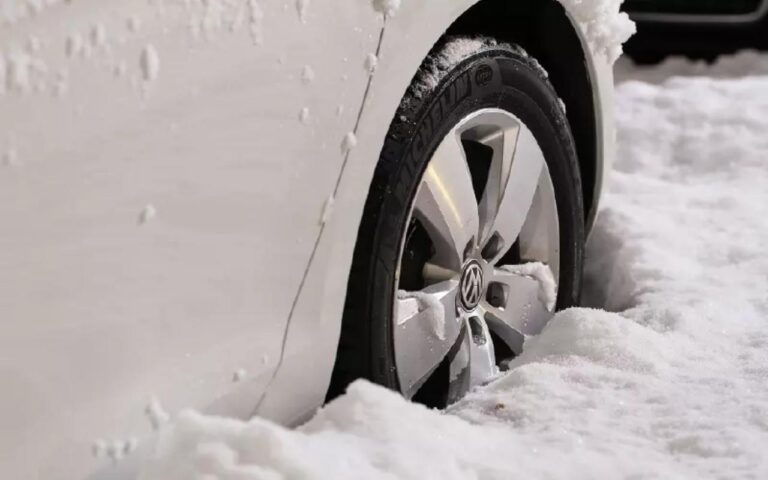Each winter tire brand comes with its tread life warranty. The tread life warranty of most winter tires averages 50,000 miles. So, how many miles do snow tires last?
The answer is, it depends. It depends on how you use your snow tires and other factors that may cause you to replace your tires prematurely, such as road hazards and uneven tread wear. A rough estimate is that snow tires could last between 8 to 11 winter seasons.
According to the United States Department of Transportation Federal Highway Administration, Americans’ average mileage per year is 13,500 miles. Theoretically, it is around 4500 miles per winter season.
If you fall into this estimate, your snow tire would likely last for at most eleven seasons. Then again, other factors may affect the tread life of your winter tires.
Stick around to learn more about the factors that affect the life of your snow tires and other relevant and valuable details.
Reasons Snow Tires Don’t Last Long
As you learned, snow tires could approximately last at least eight winter seasons. However, other reasons directly affect how long your winter tires last. Let’s talk about them below.
Using Snow Tires Off-Season
A common mistake that vehicle owners commit is to keep their snow tires on their cars even when the winter season is already over. I get it – we want to save some bucks on our tires, so we tend to keep them even if they are no longer appropriate for the weather.
However, this may not be the best thing to do. First off, if you drive your snow tires all year round, it can be dangerous for you. Winter tires are for cold temperatures, so using them in the summer could pose a potential danger as the rubber compound may not withstand the high temperature.
The treads of your snow tires may wear out prematurely if you drive with your winter tires off-season. It is because the tread components of your tires may not be compatible with different weather conditions.
The best thing to do is to unmount your snow tires when the season is over to ensure that they will still serve you a few more winter seasons.
Improper Storage
If you have been responsible enough to unmount your winter tires when the season is over, the next question is: Did you store your tires properly? If snow tires are not stored correctly, their life could be shorter, or you may not be able to use them again for another season.
Road Hazards
Road hazards such as spikes, debris, potholes, or curbs could cause damage to your tires which could potentially make them irreparable. Generally, you can repair tires with small holes or puncture in the tread area.
However, if the puncture or the damage is on the sidewall, you should replace your tires.
Uneven Tread Wear
Uneven tread wear can be a reason that you cannot maximize the mileage of your winter tires. Tires with uneven tread wear are not comfortable to drive, and if you get a mechanic’s advice, he will likely tell you to replace your tire.
What could cause uneven tread wear? The typical causes of uneven tread wear are poor wheel alignment, improper tire inflation, and lack of tire rotation.
Misaligned wheels will cause uneven tread wear because the tire will not rotate smoothly. If you start noticing vibrations, likely, your wheels are not correctly aligned. The best thing to do is to have a technician dynamically balance your wheel and tire assemblies.
Tire inflation also influences the uneven wearing of your tire treads. Underinflating your tires would likely wear out the tire shoulders faster than the other parts.
On the other hand, overinflating your tires would cause severe wear on the center part of the tire tread. When this happens, your tires will start to give you poor performance.
Most vehicles nowadays already feature TPMS sensors to tell you if your tire’s air pressure is correct. Make use of this safety feature and ensure that you have the correct tire pressures. Other drivers or vehicle owners may argue that TMPS sensors are unnecessary on winter tires, but I will say otherwise.
It would be best if you had TPMS sensors for your winter tires because they give you added safety. That is the reason why the state has required TMPS for vehicles since 2007.
How to properly store your snow tires?
There are a few tips for properly storing your unmounted snow tires. Please take a look at them below.
- Tip 1: Clean up your tires. Before preparing your tire for storing, clean them up from gunk and grime could prevent potential damage.
- Tip 2: Wrap your tires using tire wrap or storage bags to protect them from naturally occurring ozone in the air that could cause your tires to dry and crack.
- Tip 3: Store your tires in a cool room. Exposing your snow tires to direct sunlight or high temperature could cause potential damage.
- Tip 4: Ensure your tires do not make contact with lubricants, solvents, or any chemicals that could damage the tire’s rubber compound.
- Tip 5: Position them properly. If your tires are off the rim, it is best to store them standing up. If the tires are on the rim, it is best to hang them up.
You could read this article for more tips on how to store your winter tires properly.
How to Make Your Snow Tires Last Longer
If you want to extend the tread life of your snow tires, there are things you should do. In the section above, you already learned the common causes why your winter tires could not last long. Among the reasons are the things you can directly control.
First, you need to ensure that you use your winter tires for the winter season only. Don’t think that using it throughout the year could save you money because it will not. If you’re in an area that does not experience worse winter conditions, maybe get one of those all-season tires instead.
However, if you choose to use snow tires, you need to replace them when the winter season is over.
Another thing that would help your snow tire last longer miles is to ensure that you store them properly. This step is well within your control. Remember the tips you learned above, including cleaning your tires before storing them, wrapping them up, not exposing them to direct sunlight, avoiding chemical contacts, and positioning them correctly.
You could also ensure that your wheels are correctly aligned, and your tire pressures are correct. This way, your tires can wear out evenly, extending their tread life.
Some tires also require rotation, so pay attention to the tire’s manual. If it says that rotation is necessary, rotate your tires. In my case, I do rotate my tires because I see that it helps promote even tread wear, thus prolonging the tread life of the tires.
RELATED: Sentury Touring Tire Review
When to Replace Your Snow Tire
Generally, you replace your snow tires when their tread wears out or suffer from damage that could potentially cause an accident. It is no different compared to tires dedicated for other seasons.
As tire manufacturers suggest, you should replace your tires when they hit the final 2/32 depth of tread. Replacing your winter tires is highly dependent on their tread condition.
To ensure safety, car owners should conduct a regular check-up of their tire’s condition. This routine check is part of being a responsible driver. You would not like it when you get stranded helplessly due to a tire failure that you could have avoided if you just diligently checked your tires.
If your tires suffer from road damage like punctures or cuts, or maybe vandalism, bring your vehicle to the nearest service center and have the technician assess the condition of the damaged tire. See if it is still repairable or if a replacement is required.
Generally, tire experts suggest that you must not repair damages to the tire’s sidewall. This advice is because of the potential danger it brings. Tire repair shops may seal the hole or the cut on the sidewall, but there is still a high risk that the tire can blow up due to repair malfunctions.
Conclusion
Snow tires come with a mileage warranty. The mileage warranty of a tire does not necessarily guarantee that it is the actual life of the tire – it is a mere estimate.
Roughly, a winter tire could last between eight to eleven winter seasons provided that you unmount them when the season is over and store them properly.
The average car annual car mileage in the U.S. is 13,500, according to the United States Department of Transportation Federal Highway Administration. This approximation is where we base the computation on how many seasons winter tires last.
To ensure that your winter tires would last longer or at least close to the mileage warranty, you must take proper care of your tires. Remove them when winter is over, store them correctly, make sure you check them for even treadwear by inflating them correctly or aligning your wheels appropriately.

